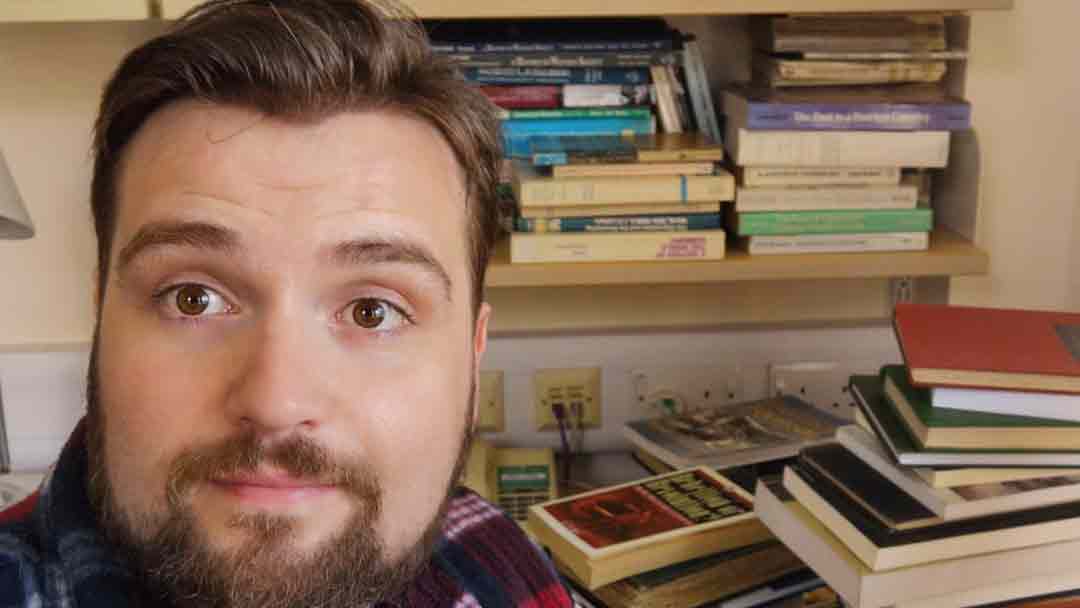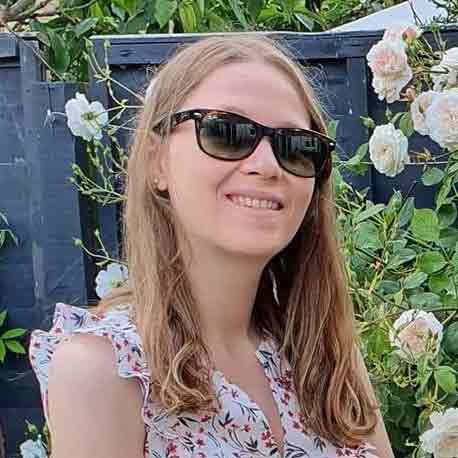Since childhood, James Jefferies has been interested in aeroplanes and it was that early interest that fuelled his current PhD research into British cultural memory of war in the air 1914-45 and RAF Bomber Command 1939-45.
James is also involved in History Indoors and The Logistics of the Battle of Britain. I spoke to him to find out why he chose to study aerial warfare and how he is finding his new role as Assistant Lecturer, working on HR101 Becoming a Historian and HR100 The Making of the Modern World Since 1750.
What did you study as an undergraduate and what inspired you to choose that subject?
So, my BA was in drama not history. I was lucky to take two outside option history modules, one about twentieth-century Europe and the other about the USA. I always found when I was studying drama modules, I would want to focus on the context of the time, the plays were written and what they were saying. In one module we studied Oh What a Lovely War which was created in the 1960s and was made into an all-star-cast film directed by Richard Attenborough in 1969. It was very much an anti-war film that said more about how the war was viewed in the 1960s than anything else. I really enjoyed looking at how history is interpreted in popular media and how it reflects cultural changes and perceptions/understandings. I should have known then I should have stuck to history, but I did really enjoy my time studying drama. I think it gave me confidence in speaking in front of an audience and of course taught me to think critically and look at things from many angles. I think it also taught me the value of interdisciplinary methods of study.

After studying drama for your undergraduate degree, what made you choose history for your MA?
I had a friend who was starting an MA and she said I should really give it a go. I’d been working a couple of years and the drama side of things had slowly disappeared but with history I was still getting very excited about it and going to talks, reading and I had a few ideas and thoughts on a few subjects. I looked into the MA and saw the course had some very interesting modules, such as the Public History Workshop which was looking at topics including films, tv and museums, and I was sold! As soon as the first few weeks went by, I wondered why I hadn’t done this sooner! I loved studying my MA.
Did you have a teacher at school, college or university that inspired you and if so, how?
Dr Nadine Rossol’s Past in Hiding module really opened my eyes to new ways of seeing how the Second World War is remembered throughout Europe. Why do some countries remember and commemorate it in a different way to others? Just fascinating stuff. I learnt a lot about approaches to some very sensitive topics as a historian and also about how to teach on these subjects.
I also really got a lot of inspiration from Dr Mark Frost when he taught the Public History module. Similarly, I learnt a lot about different approaches to a variety of topics and subjects. Mark and Nadine are awesome. I also learned a lot about how history is consumed by the public and what we as historians can learn from this. It really sparked a lot of interest for me in this area and is a big part in my PhD.
What does being an Assistant Lecturer involve and are you enjoying the role?
I am teaching on three seminars for two separate modules, Making of the Modern World and Becoming a Historian. I usually start with a warmup question or play a video and then ask the students to give me their thoughts. I’ll bring in quotes and sources and then we discuss the readings for that week. I also mark coursework and have regular meetings with the module directors. I absolutely love the role and being able to share my passion for history. The students too are really engaging and impress me every week with their insights. We have some great discussions about a variety of topics, but I do like to try and get them to think ‘outside the box’ on topics. Tracey Loughran’s recent lecture on primary sources was very inspiring for me as it suggested anything could be a primary source depending on how/why it’s being examined. A really key point. This was a great topic to discuss with my students and each week they impress me more and more. It’s great seeing their confidence to engage in topics grow each week.
You worked at the University as a Student Engagement Project Worker and as part of the Professional Services Team in SPAH. How do you feel your experience working in departments has helped with your role as Assistant Lecturer?
The Project Worker position came about because of the excellent careers centre here at Essex and the internships they offer. That then lead to my four years in admin with the School of Philosophy and Art History. On a practical level I learnt a lot about the various systems and how things worked, such as databases and departmental processes. This has been really useful in my Assistant Lecturer role. I also learned a lot about the University structure, such as what support services are available for students or how course structures work. I learnt a lot about balancing workloads which is a great skill to develop. I built up a lot of confidence and I loved it and met some great people. The main thing I learnt was to appreciate the hard work of admin teams and how important they are (do I get my £10 now, Hannah?).
How do you balance the pressures of your role as an Assistant Lecturer and your PhD research?
Keeping a good balance is vital. I’m really lucky to have staff here that understand this and are so supportive. Whether they are my PhD supervisors, the module directors or the departmental professional services staff. They are always open to speak to and happy to offer advice and support. I’m also blessed to have some great friends that are other research students here at Essex so we can chat and share ideas. We see each other in the research rooms and have online chat groups on social media. Many of these are also Assistant Lectures that have either started with me or have taught for some time. This support is so important to me. The main advice for balance is that I allocate time to certain tasks. Sometimes deadlines mean one takes priority but with this I always give myself space and time to relax. I also highly recommend a stroll around the campus grounds for a break during busy days.
You are working on a project as a historical consultant for The Logistics of the Battle of Britain. Can you tell us a little more?
Very happy to! So, it’s for Junto Media and it’s called Real Engineering: The Battle of Britain. I mainly work on laying out script ideas and writing sections along with another historian and the producer. We have regular meetings and share ideas about what to put in episodes. I’m trying to show things from a different angle so include different perspectives, such as from the Women’s Auxiliary Air Force, and try to make sure that as well as covering the essential information on the Battle, it also offers something new. It’s my first experience as such but it’s led to a few other things (watch this space) and I’ve learnt so much from it. In my thesis I am writing about history in films, tv and documentaries and so to get this practical experience is rewarding on that level too. It’s definitely something I’d like to continue doing.
Why did you choose to focus your research on British history, specifically British cultural memory of aerial warfare?
I’ve been a bit of an aeroplane nerd since I was a toddler. I don’t know what it is, they’re fast, loud and you can zoom off up into the sky. I think as I’ve learnt more about the history of flight and Britain’s cultural memory of it, it’s very much made me ask more questions. At the same time, I’m very interested in how both the First World War and Second are remembered very differently yet that overall memory differs to the memory of the war in the air. We talk about both wars a lot but in very different ways, I really want to get to the root of these reasons. I always feel people go “oh not another World War historian” but I want to know why Britain seems to hold such a fascination and different memory of these conflicts to other countries. I think the war in the air is a great route to learn more about this. Plus, I get to talk about and see lots of aeroplanes making my inner 5-year-old very happy.
What one piece of advice would you give to a new student about to study history?
Always consider context. Whether this is a primary or secondary source, think about why it was written, when, and by whom. If it’s a monograph, where does it fit in the historiography? What’s its ‘goal’? What have other historians written about this subject? Don’t be afraid to question but also have an open mind. Evidence is key but analyse that evidence. Being inquisitive is what it’s all about!
Lastly, I’ve heard that you haven’t yet tried a crisp flavour you didn’t like. Have you not tried prawn cocktail?
But Skips!?!? Who doesn’t like Skips!? I’m also a bit of a cheese fan. I found a little cheese shop when I went to Lincoln last month and it was just the best place.


